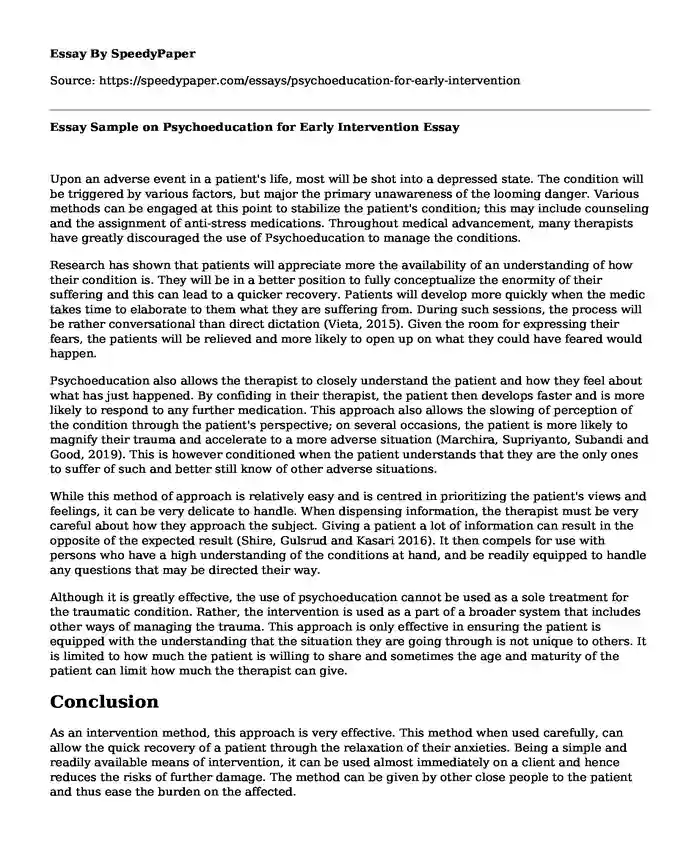
| Type of paper: | Critical thinking |
| Categories: | Counseling Depression Anxiety disorder |
| Pages: | 3 |
| Wordcount: | 614 words |
Upon an adverse event in a patient's life, most will be shot into a depressed state. The condition will be triggered by various factors, but major the primary unawareness of the looming danger. Various methods can be engaged at this point to stabilize the patient's condition; this may include counseling and the assignment of anti-stress medications. Throughout medical advancement, many therapists have greatly discouraged the use of Psychoeducation to manage the conditions.
Research has shown that patients will appreciate more the availability of an understanding of how their condition is. They will be in a better position to fully conceptualize the enormity of their suffering and this can lead to a quicker recovery. Patients will develop more quickly when the medic takes time to elaborate to them what they are suffering from. During such sessions, the process will be rather conversational than direct dictation (Vieta, 2015). Given the room for expressing their fears, the patients will be relieved and more likely to open up on what they could have feared would happen.
Psychoeducation also allows the therapist to closely understand the patient and how they feel about what has just happened. By confiding in their therapist, the patient then develops faster and is more likely to respond to any further medication. This approach also allows the slowing of perception of the condition through the patient's perspective; on several occasions, the patient is more likely to magnify their trauma and accelerate to a more adverse situation (Marchira, Supriyanto, Subandi and Good, 2019). This is however conditioned when the patient understands that they are the only ones to suffer of such and better still know of other adverse situations.
While this method of approach is relatively easy and is centred in prioritizing the patient's views and feelings, it can be very delicate to handle. When dispensing information, the therapist must be very careful about how they approach the subject. Giving a patient a lot of information can result in the opposite of the expected result (Shire, Gulsrud and Kasari 2016). It then compels for use with persons who have a high understanding of the conditions at hand, and be readily equipped to handle any questions that may be directed their way.
Although it is greatly effective, the use of psychoeducation cannot be used as a sole treatment for the traumatic condition. Rather, the intervention is used as a part of a broader system that includes other ways of managing the trauma. This approach is only effective in ensuring the patient is equipped with the understanding that the situation they are going through is not unique to others. It is limited to how much the patient is willing to share and sometimes the age and maturity of the patient can limit how much the therapist can give.
Conclusion
As an intervention method, this approach is very effective. This method when used carefully, can allow the quick recovery of a patient through the relaxation of their anxieties. Being a simple and readily available means of intervention, it can be used almost immediately on a client and hence reduces the risks of further damage. The method can be given by other close people to the patient and thus ease the burden on the affected.
References
Shire, S. Y., Gulsrud, A., & Kasari, C. (2016). Increasing responsive parent-child interactions and joint engagement: Comparing the influence of parent-mediated intervention and parent psychoeducation. Journal of autism and developmental disorders, 46(5), 1737-1747.
Marchira, C. R., Supriyanto, I., Subandi, S., Good, M. J. D., & Good, B. J. (2019). Brief interactive psychoeducation for caregivers of patients with early phase psychosis in Yogyakarta, Indonesia. Early intervention in psychiatry, 13(3), 469-476.
Vieta, E. (2015). Staging and psychosocial early intervention in bipolar disorder. The Lancet Psychiatry, 2(6), 483-485.
Cite this page
Essay Sample on Psychoeducation for Early Intervention. (2023, Feb 08). Retrieved from https://speedypaper.net/essays/psychoeducation-for-early-intervention
Request Removal
If you are the original author of this essay and no longer wish to have it published on the SpeedyPaper website, please click below to request its removal:
- The World Needs Culture Education - Free Essay on SpeedyPaper
- Marketing Essay Sample - Pricing Strategy
- Free Essay Comprising New York Police Department Application
- No Name Woman and The Yellow Wallpaper, Literary Essay Sample
- Essay Sample on the Influence of Electronic Sports Games on Young Generation
- Free Paper for You on Using Tact and Diplomacy in Treatment Groups
- Essay Example: Effects of Diversity in a Work Place
Popular categories




